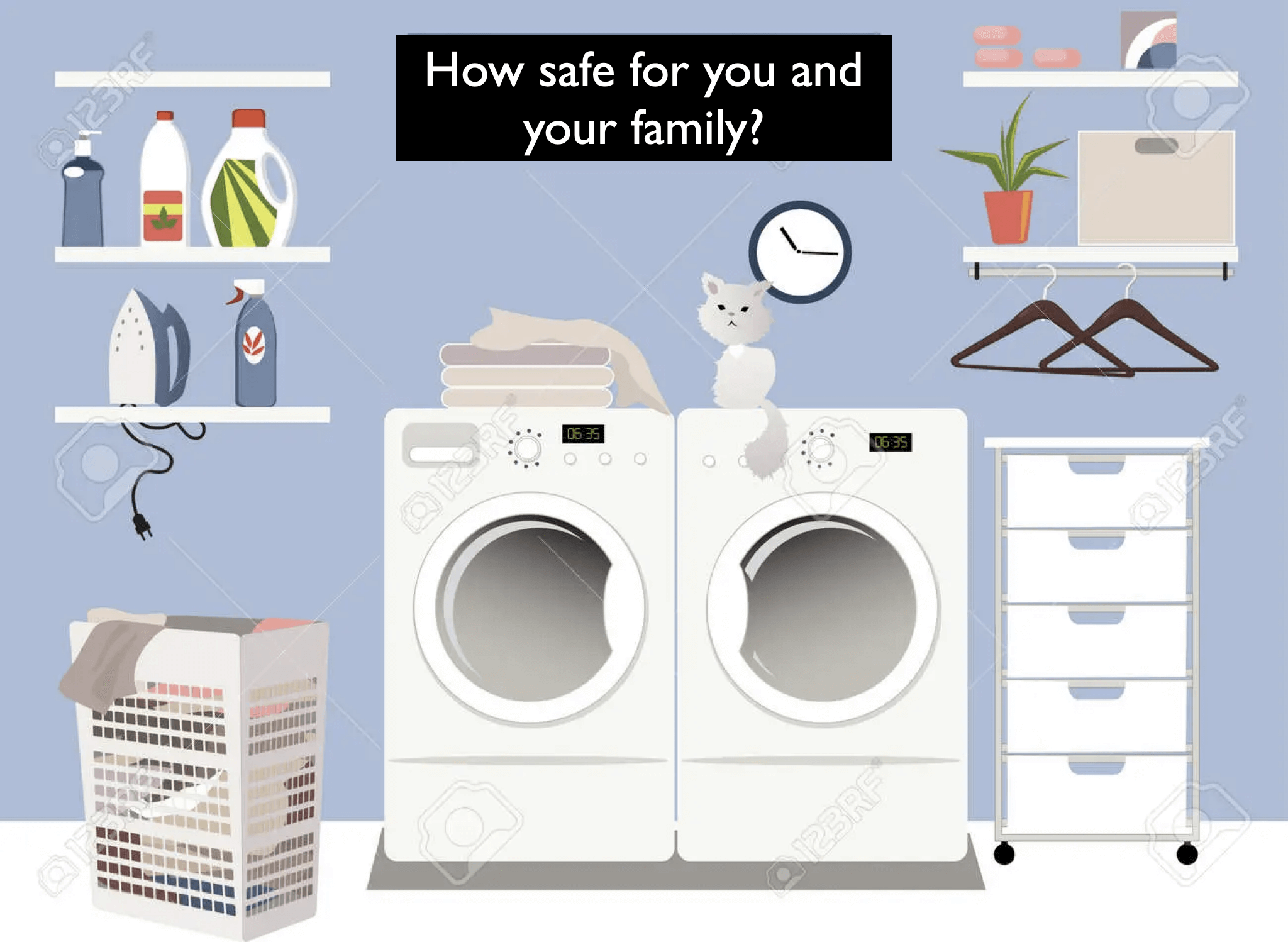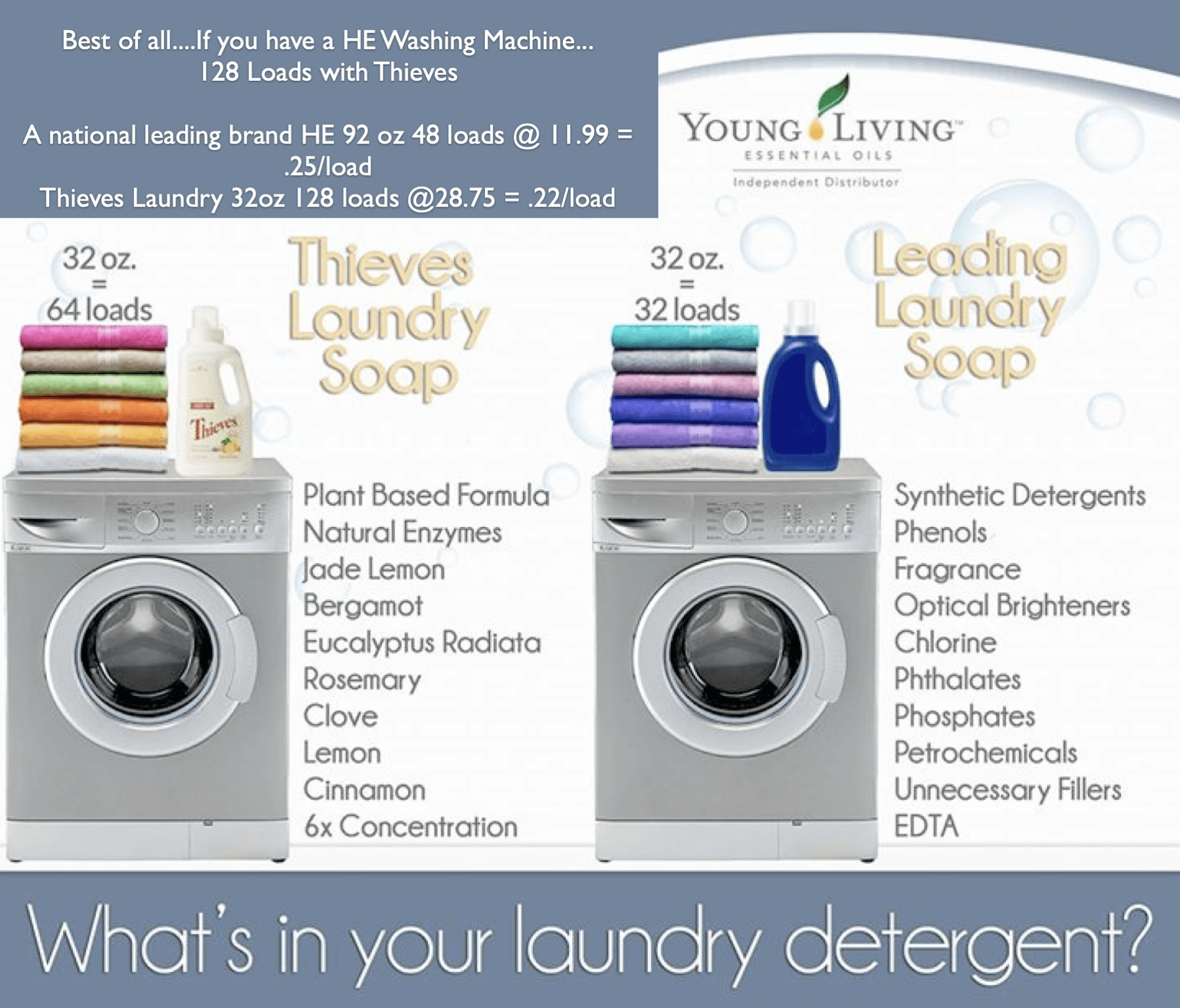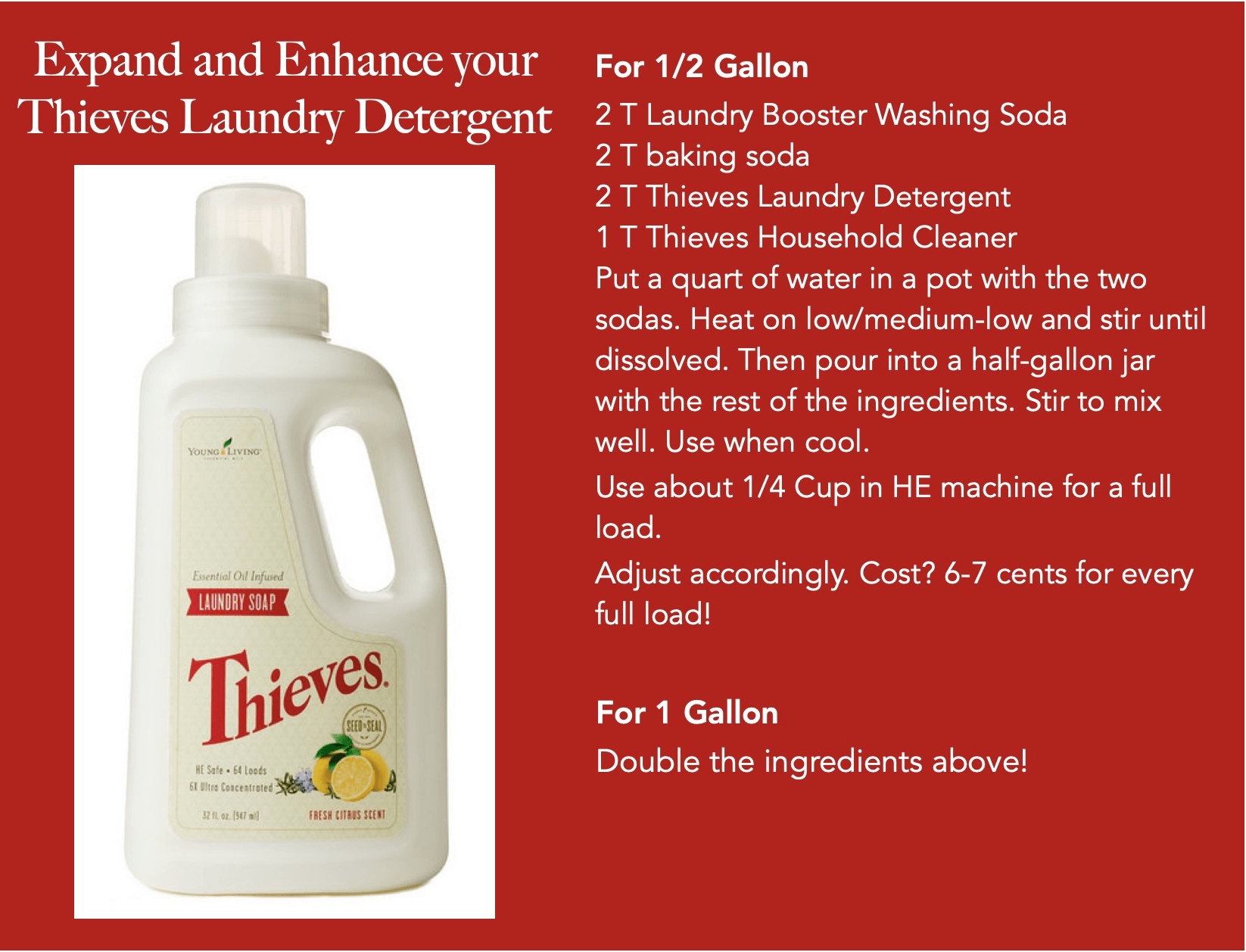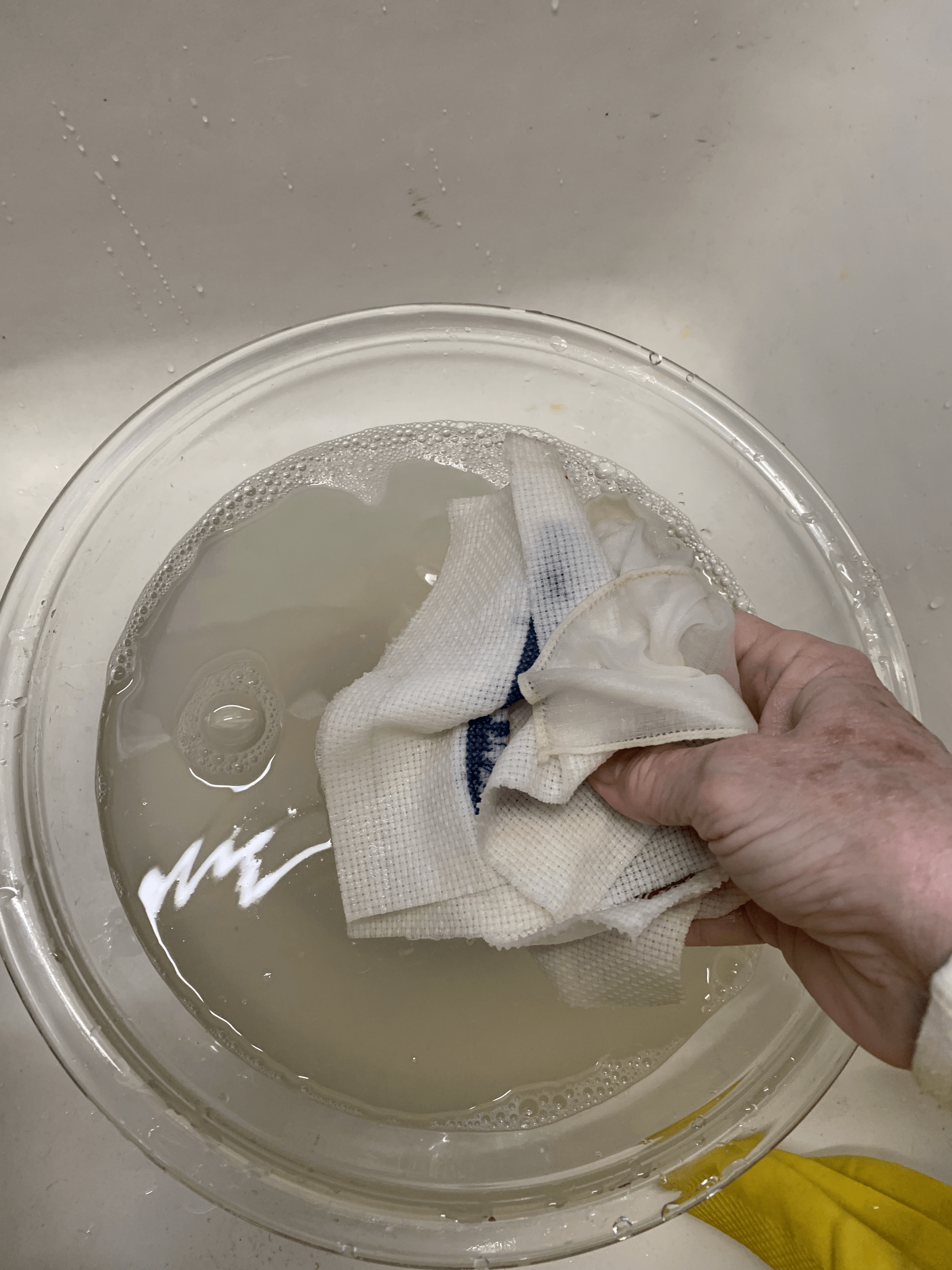
I avoid the laundry aisle at the grocery store like the plague. Since I don’t buy my laundry products there, I rarely have to walk down it. But when I do, I find myself holding my breath and hurrying through as fast as I can!
Have you ever stopped to consider what might be lurking in that ‘fresh’ laundry scent?
What’s the problem?
Our bodies are facing a “toxic overload” these days. We’re surrounded by toxins—through personal care products, the foods we eat, and even the air we breathe. The issue isn’t just for those with health concerns; our bodies aren’t built to handle today’s toxic load. What might surprise you is that your laundry detergent could be a big part of this problem. Fabric touches our skin 24/7, and every fabric is washed.
The Hidden Dangers in Laundry Detergents
Most laundry products are filled with chemicals that can harm our health, but you’d never guess it from the ads that focus on “freshness” and “clean.” Often, these products contain hidden toxins that can stay in our clothes and bedding, constantly in contact with our skin. And the dangers don’t stop there—these chemicals also release fumes as you wash, affecting the air you breathe.
Greenwashing: Are Your Products Truly Safe?
Even worse, some companies “greenwash” their products, using health-conscious phrases on the front of their bottles while the ingredients list tells a different story. And while dryer sheets have gotten some attention for their toxicity, it’s just as crucial to consider the detergents we use daily.
Certain groups are more sensitive to these chemicals, like children, the elderly, and anyone with sensitive skin. Even our pets, who snuggle up with us on beds and couches, can suffer from hidden allergens in laundry products. But anyone can be affected by toxic detergents—especially given how we’re already bombarded by chemicals from all angles.
The good news? Switching to healthier laundry options is easy and can make a big difference. By being mindful of our laundry choices, we can help reduce our toxic load and protect our health and the health of those around us.
A 2009 study enlightens us on the problems of identifying harmful ingredients in industrially created household products:
“‘Fragranced consumer products,’ as termed in this article, refers to products with a fragrance or scent, such as air fresheners, deodorizers, laundry detergents, fabric softeners, dishwashing detergents, hand sanitizers, personal care products, baby shampoo, and cleaning supplies. These products are widely used by individuals, industries, and institutions. For instance, an estimated 37% of the households in America use a best-selling laundry detergent; one analyzed in our study. Product formulations are typically complex. In addition to the ‘product base’ mixture, a single ‘fragrance’ in a product may contain up to several hundred substances among more than 2600 substances, both natural and synthetic, documented as fragrance ingredients. Formulations are also confidential, and no U.S. regulation requires the disclosure of any ingredient in a fragrance mixture, or of all ingredients in consumer products.” (Steinemann AC, et al., Fragranced consumer products: Chemicals emitted, ingredients unlisted, Environ Impact Asses Rev (2010), doi:10.1016/j.eiar.2010.08.002)
This study focused only on fragrances. What would they find if they included all the synthetic components used in our products? Mind-boggling!
What’s really in your detergent? Could it be affecting your health?
The Most Harmful Chemicals in Laundry Products
Here’s a look at some of the most damaging compounds found in laundry soaps and how they affect our bodies, particularly the brain:
- Fragrances
- Concerns: Many synthetic fragrances contain phthalates, which are known to disrupt hormones. They can also trigger allergies, migraines, and asthma, and contribute to mood disturbances like anxiety or irritability. Some fragrance ingredients are classified as potential carcinogens.
Phthalates are petroleum-based chemicals used in many fragrances. The biggest issue with phthalates is that they’re potent hormone disruptors. Whether we’re breathing them in or absorbing them through our skin, phthalates muddy up our hormones in many ways.
Upregulation of estrogen and oxidative stress caused by phthalates negatively affect both men's and women’s reproductive organs and fertility. In men, that means reduced sperm concentrations, poor motility, and risk of testicular cancer (3). In women, it affects the release and maturation of eggs and can lead to ovulation problems and increased risk of endometriosis and PCOS
- Brain Impact: Phthalates and other fragrance chemicals can interfere with brain development and function, particularly in children, potentially contributing to cognitive issues.
- Sodium Lauryl Sulfate (SLS) and Sodium Laureth Sulfate (SLES)
- Concerns: These surfactants are harsh irritants that can provoke allergic reactions, especially in people with sensitive skin or respiratory conditions. They also contain 1,4-dioxane, a probable human carcinogen.
- Brain and Mood Impact: Though they primarily affect skin and respiratory health, SLS and SLES can also contribute to mood issues and irritability due to their irritating effects and potential to disrupt the skin barrier, leading to inflammation.
- 1,4-Dioxane
- Concerns: This chemical is often found in detergents as a by-product of the manufacturing process, particularly in products with SLES. 1,4-Dioxane is linked to cancer and is classified as a probable human carcinogen by the EPA.
- Brain Impact: Chronic exposure to 1,4-dioxane has been associated with damage to the central nervous system, liver, and kidneys, which can indirectly affect brain function.
- Formaldehyde
- Concerns: Formaldehyde is sometimes present in detergents as a preservative or by-product. It is a known carcinogen that can also trigger allergic reactions, especially affecting the respiratory system and skin.
- Brain and Mood Impact: Exposure to formaldehyde has been linked to headaches, dizziness, and difficulty concentrating. Over time, it can increase the risk of memory issues and may contribute to neurodegenerative diseases.
- Optical Brighteners
- Concerns: These chemicals are designed to make clothes look whiter but can cause skin allergies and irritations. They are persistent environmental pollutants and may contain carcinogenic ingredients.
- Brain and Mood Impact: While not directly linked to mood, optical brighteners can contribute to inflammation and skin irritation, indirectly affecting mental well-being and increasing stress and irritability over time.
- Quaternary Ammonium Compounds (Quats)
- Concerns: Used as disinfectants, quats can provoke skin allergies and respiratory problems. Long-term exposure has been associated with hormone disruption and may contribute to certain types of cancer.
- Brain and Mood Impact: Quats are linked to respiratory irritation, which can exacerbate mood disorders like anxiety. They also have neurotoxic potential, meaning they can negatively impact the nervous system over time.
Are you or your loved ones experiencing unexplained allergies, skin irritations, or mood changes? Could your detergent be playing a role?
Choosing a Better Detergent: What to Look For
When was the last time you checked the ingredients in your laundry detergent?
Switching to natural laundry solutions can help minimize these risks, creating a healthier home environment and promoting better long-term well-being. You can avoid these toxins by using unscented, plant-based detergents or DIY alternatives.
- Plant-Based
To avoid petroleum-based chemicals and synthetic ingredients, choosing plant-based alternatives is important. Unfortunately, it will require some work on your part because you can’t believe everything companies advertise.
There isn’t a strict definition of “plant-based,” so you’ll need to do some label-reading to make sure the ingredients in a specific detergent are really natural. Also, keep in mind that SLS and SLES can be considered naturally derived ingredients and show up even in green and plant-based laundry detergents.
- Zero Fragrance OR Naturally Scented
If you have sensitive skin, it’s almost always best to go with unscented laundry detergent. Again, always read the label to make sure “fragrance” or “parfum” isn’t listed. They can show up as scent-maskers even in supposedly unscented products.
A second option is to choose a naturally scented detergent. Don’t fall for a product that has the vague words “natural fragrance.” Instead, make sure the company lists the ingredients used in their scent. They should be pure essential oils, plant extracts, or something similar.
- Safe for Humans and the Environment
While you always want to scan labels to avoid ingredients toxic to humans, don’t forget about the environment! Chemicals in laundry detergents are very likely to end up in our waterways — both after consumer use and during the manufacturing product.
In Conclusion: Choose Safer Laundry Options
We’re surrounded by toxins every day, and laundry detergents are often a hidden source. The good news is that you have options! By choosing plant-based, unscented, or naturally scented detergents, you can reduce exposure to harmful chemicals. Taking these steps can help minimize your toxic load, protect your health, and support a cleaner environment for everyone.
Are you prepared to make a switch to protect both your health and the environment?
The Environmental Working Group (EWG) lists on its “A” list of the safest most toxin-free laundry detergents the following brands:
✔✔ Ecover ZERO Laundry Liquid Concentrate
✔✔ biokleen Laundry Liquid, Citrus Essence
✔✔ Planet 2x Ultra Laundry Detergent
✔✔ GrabGreen Delicate Laundry Detergent Pods✔✔ Sun & Earth Laundry Detergen
✔✔ biokleen Laundry Liquid, Citrus Essence
✔✔ Planet 2x Ultra Laundry Detergent
✔✔ GrabGreen Delicate Laundry Detergent Pods✔✔ Sun & Earth Laundry Detergen
✔✔ Green Shield Organic Laundry Detergent
This is what I use - Young Living's Thieves Laundry Soap.
Free from SLS, dyes, petrochemicals, formaldehyde, phosphates, synthetic perfumes, chlorine, and optical brighteners.
Designed to be powerful and efficient, this concentrated 32-ounce bottle of Thieves Laundry Soap can clean up to 64 loads of clothing. Harnessing the power of stain-fighting enzymes and our signature Thieves premium essential oil blend, the plant-based formula of Thieves Laundry Soap is a straightforward clean with no surprises and no synthetics.

I dilute it like this, and notice the cost per load!!!

Here is what happened when I let some handiwork soak in water with some of the Thieves dilution I made (above).
Look at that dirty water!!!

Don't have a Young Living account for Thieves Laundry Soap? Click here: Thieves Laundry Soap
Be sure and use the code SHAREYL for the discount available.
AFFILIATE DISCLAIMER: I’m a proud affiliate for some of these tools and products that are suggested on this page and throughout my site. If you click on a product and make a purchase, I may earn a small commission at no extra cost to you. My recommendations are based on knowledge and experience and I recommend them because they are genuinely useful, not because of the small commission I may receive |




















0 Comments